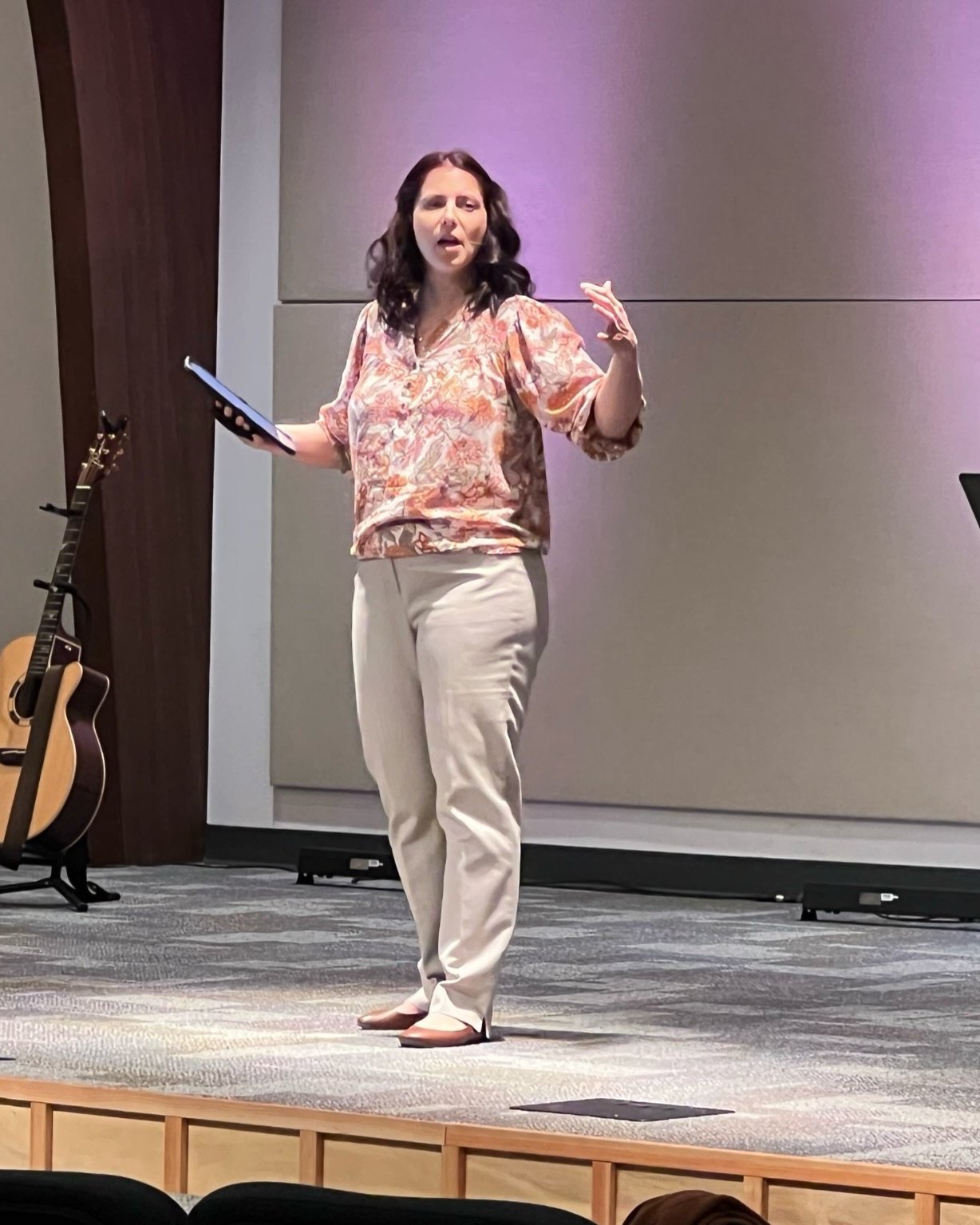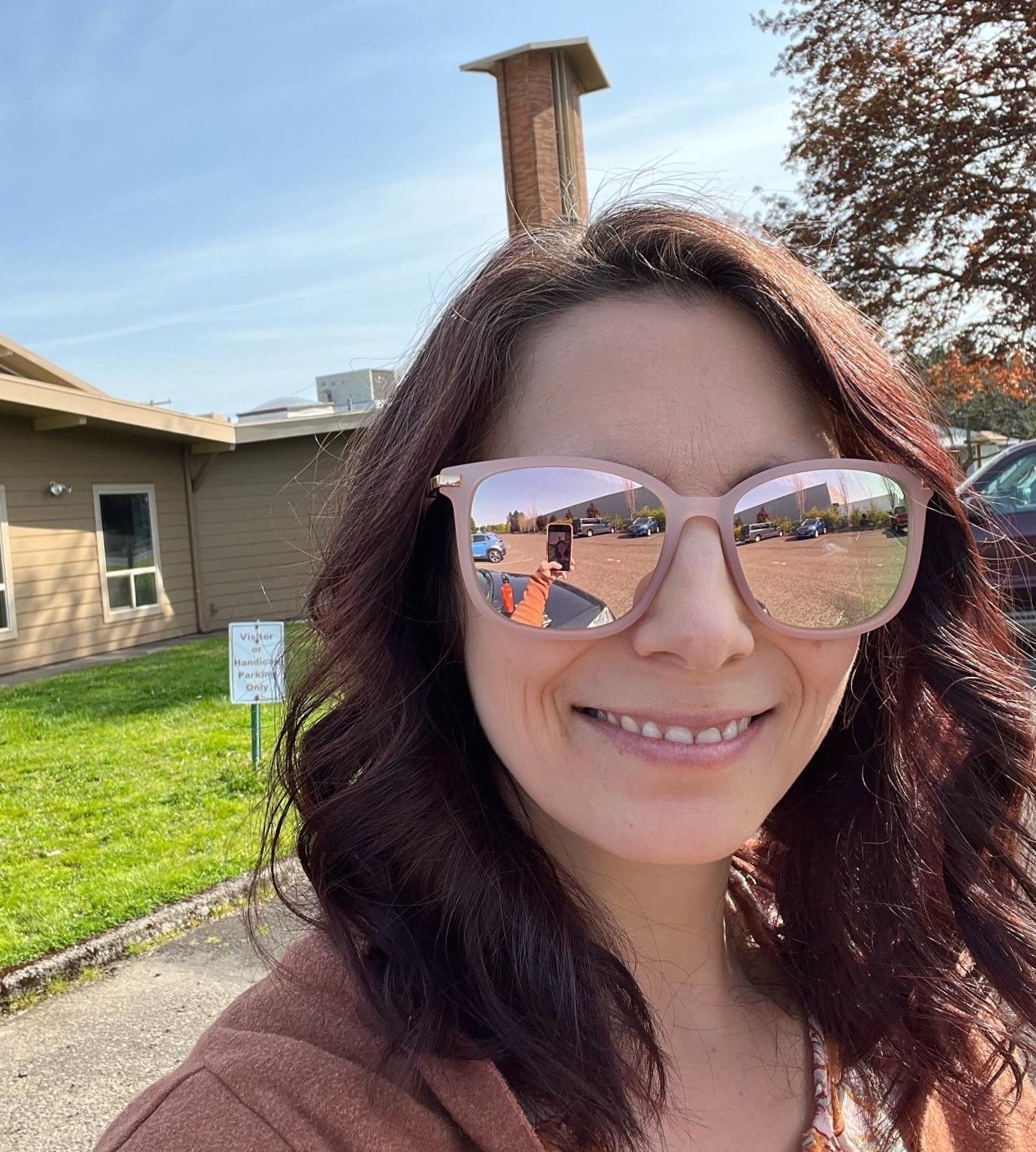The World Runs on Story
This was originally a sermon given at Vancouver First Friends Church on April 24th, 2022.
View the video HERE.
It's said that Ernest Hemingway was once challenged to write a story in only 6 words. This is his story: "For sale: baby shoes, never worn." Inspired by this, in 2006, Larry Smith, founder of SMITH Magazine, gave the challenge to his community of readers to describe their lives in exactly six words. It's now become a worldwide phenomenon. You can find hundreds of thousands 6-word stories in books, podcasts, and on the website sixwordmemoirs.com.
Here are a few of them:
"New puppies. Limited warranty. Guaranteed heartbreak." L2L3
"Forge a path, Invite some possibilities." NatJC
"Family isn't really important. It's everything." Kathrynp
"I deserve the lies I choose." Steve_Anthony
"Staying centered is my full-time job." l8leigh
"Tried too hard, lost everything instead." siegecanlas
"Her hopes up the windows down!" TJV
The Importance of Story
There is a shift in the narrative of the world around us. If you have been paying attention to the media, not just the news but movies, social media, YouTube, and the countless people each year who start a blog, we see a high value on vulnerability, openness, and authenticity. The importance of sharing where we are and how we got here is higher now than ever.
In the past few years alone, we've seen an outpouring of stories through the #metoo movement, racial injustice stories, and the grief and lament of a global pandemic, highlighting human loss, economic hardships, and painful separation. Currently, there this a war going on between Ukraine and Russia. It is Ukraine that has captured the heart of the world because they have been vocal about sharing the story of the losses, their wins, and their experiences.
You may be familiar with the word deconstruction, a practice among Christians and sometimes former Christians to break down what happened in the past to further understand and clarify our faith. They are trying to understand the story of where the Church came from to understand why they are where they are today and to know how to move forward in the future. This often leads to a healthy reconstruction and makes people more substantial in their faith. Unfortunately, some have been led away from their faith, often because of the actions of the Church at large, not because of anything the Scripture has to say.
The Bible is Story
For those of us who know the Bible, we've known that story is the secret key for longer than the world around us, but I challenge that we've forgotten to embrace our story somewhere along the way.
When we look through the Old Testament, we see the historical text from Adam and Eve to the birth of the Israelite nation to their exile to their return.
The psalms are full of recounting the history of the Israelites as they passed along their story to the next generations.
In Mark 5, Jesus healed a demon-possessed man. When the man asks to go with Jesus, he tells him that he must stay and tell his story of healing. This is not to mention the full story of Jesus in the 4 Gospels, Matthew, Mark, Luke, and John.
In Acts, we see the historical account of the followers of the Way and the rapid spreading of Jesus because of the religious persecution.
In Revelation 12:11, we are told the "battle is won by the blood of the Lamb and the word of their testimony." We are invited in by God to win the war alongside him, alongside the very blood and power of Jesus Christ with our testimony.... our story.
If I were to ask you, right here at this moment, what is your story, would you be able to share this comfortably? Do you know how Jesus has met you, changed you, and charged you with impacting his Kingdom here on earth? Do you seek opportunities to invite others into your journey by being vocal about how God has impacted the years of your life? Do you see your role in fulfilling the Great Commission with your story?
Today we are going to dive into the life of Abram. We are going to take a look at the life of Abram before God, when God met him, and the transformation of who Abram became after this encounter. We aren't going to stop there. I believe it's important to apply what we learn in God's word, so I'll be sharing a part of my own story, hopefully as an application of what we learn today.
Life Before God
To understand the full impact of our story, it's essential to understand where it began. For Abram, his story starts in Genesis 11:10-26. This section of Scripture points out his family tree. For the sake of time, I won't share all this with you today, but here are the highlights.
Abram had a strong heritage, one of honor, faithfulness, and obedience. He descended from Shem, son of Noah. In fact, Abram was 10 generations after Noah. Abram's father was Terah, and his brothers were Nahor and Haran.
We pick up the story now in Genesis 11:27-32:
"This is the account of Terah's family line. Terah became the father of Abram, Nahor and Haran. And Haran became the father of Lot. While his father Terah was still alive, Haran died in Ur of the Chaldeans, in the land of his birth. Abram and Nahor both married. The name of Abram's wife was Sarai, and the name of Nahor's wife was Milkah; she was the daughter of Haran, the father of both Milkah and Iskah. Now Sarai was childless because she was not able to conceive. Terah took his son Abram, his grandson Lot son of Haran, and his daughter-in-law Sarai, the wife of his son Abram, and together they set out from Ur of the Chaldeans to go to Canaan. But when they came to Harran, they settled there. Terah lived 205 years, and he died in Harran."
Like many of us in our life, we find Abram living a life with both joy and sorrow.
Abram had 2 brothers. There can be a lot of joy in having siblings! But his brother Haran died and left behind a child, Lot.
Abram was married to Sarai. Marriage brings a lot of joy, excitement, and hope for the future. But he and his wife struggled with infertility, something I can only imagine caused them great sorrow.
Abram's dad Terah lived a long life, which is excellent and joyful! But, unsettled in their land for an unknown reason (likely had to do with looking for increased trade opportunities), Terah moved the whole family from their home (and where his brother was buried) from Ur of the Chaldeans to Harran. Note: they were on their way to Canaan (the land God would later call Abram to), but they settled in Harran. There, after a time, Terah died at 205 years old. While this is a good, long life, losing a parent is hard at any age.
When there is joy, sorrow is not far behind. When there are successes, there are also failures. When there is hope, grief seems to be only a moment away.
Circa 2010
In my before God story, my 6-word memoir would be "married, with a son, attending church." If I gave you that 6-word story of my life, your interpretation would rely heavily on your life experience. And just like Abram, this story is loaded with both joy and sorrow. Marriage is a good thing, but my marriage at the time was troubled and filled with turmoil. My troubled marriage was exasperating the identity issues I had since I was a teenager. I loved my son, but I didn't know who I was, which trickled down into my parenting. And while we were attending Church faithfully, no one knew the pain I was living in.
I was surrounded by people, yet I felt invisible and alone.
When God Calls
But God doesn't leave us in a place of sorrow, grief, or lament. The context of our before God story lays the foundation for when God comes to meet us and how we will respond.
Back to Abram in Genesis 12. This next section of Scripture is the beginning of what is known today as the Abrahamic covenant - a promise between God and Abram.
"The Lord had said to Abram, 'Go from your country, your people and your father's household to the land I will show you. I will make you into a great nation, and I will bless you; I will make your name great, and you will be a blessing. I will bless those who bless you, and whoever curses you I will curse; and all peoples on earth will be blessed through you.'"
There was a clear call to Abram from the Lord.
Go… There is a time for rest, but often God does not keep us in the place of rest. He meets us there, he refreshes our soul, but the purpose is always to move us out into the next place. Abram was told to GO.
,..from your country, your people, and your father's household… It's one thing when people leave our lives from moving. But there is something that happens when we are the ones to relocate. I have moved 25 times in 40 years, and I can speak to the difficulty of going through this time and again. We are ripped from our roots, and we must put ourselves, our reliance entirely on God himself to help us guide our roots into the right soil. It's also important to note that in Joshua 24:2, Terah is said to have worshipped other gods, so in leaving his father's household, he was breaking cultural ties connected to the worship of multiple gods and trusting only one God.
…to the land I will show you. Abram didn't know where he was going. He just knew it was time to go and that God would lead the way. Oh, how I long for this kind of faithfulness to God. He proves faithful time and again, but whenever my future is unclear, or I find myself in a new situation, unsure what lies ahead, hoping to catch a glimpse of the promised land, God keeps it hidden from me. He whispers Trust me.
So what does Abram receive for his faithfulness which was credited to him as righteousness? God says:
I will make you a great nation
I will bless you
I will make your name great
so that you will be a blessing
I will bless those who bless you
I will Curse those who curse you
All the peoples on the earth will be blessed through you
Note: God gave this covenant before there was "the law" - the 613 laws given to the Israelites on how to live for redemption. But before there was even a hope of how we would redeem ourselves, God gave us a way. This is a foreshadowing of Jesus Christ to come.
When God met me, it was much messier than Abram.
Circa 2013
As I mentioned, I struggled with my own bout of identity issues which spiraled me into depression. In December of 2012, I experienced what some might call an "identity crisis." I was trying so hard in my effort to be the person I was supposed to be instead of leaning on God alone for my identity, I experienced a complete melt-down. God revealed my lost heart to me so I would see what he knew from my birth - that apart from him, I am truly incapable of joy and identity.
When God meets us, it looks different. Not only from person to person, as we see here, but also from situation to situation.
Our Response
How did Abram respond to God's call? Let's pick up the narrative in Genesis 12:4-8
"So Abram went, as the Lord had told him; and Lot went with him. Abram was seventy-five years old when he set out from Harran. He took his wife Sarai, his nephew Lot, all the possessions they had accumulated and the people they had acquired in Harran, and they set out for the land of Canaan, and they arrived there. Abram traveled through the land as far as the site of the great tree of Moreh at Shechem. At that time the Canaanites were in the land. The Lord appeared to Abram and said, 'To your offspring I will give this land.' So he built an altar there to the Lord, who had appeared to him. From there he went on toward the hills east of Bethel and pitched his tent, with Bethel on the west and Ai on the east. There he built an altar to the Lord and called on the name of the Lord."
God said GO and Abram went.
He took his nephew Lot and Sarai and all the possessions he had acquired.
Abram was 75 years old, which might be more considered mid-life, considering he lived to be 175, but not too old to be called by God.
God met Moses in the burning bush at the age of 80
Zechariah was "very old" when he met the angel Gabriel and was told he and Elizabeth were going to have a baby - John the Baptist
It is never too late, nor is it ever too early, for God to use us. If we have breath in our lungs, he has a call on your life.
They went to Canaan, the original destination of his father Terah.
Abram's response was immediate. Are we quick to respond to God? Or do we grind our heels in, determined to stay where we are comfortable?
The Lord showed Abram the land his offspring would be given. There he built an altar to the Lord. The altar is always an act of remembrance for what God has done and a receiving of the promise given.
There were 2 altars built. The first was an immediate response to remember and receive what the Lord pointed out as the land before Abram's eyes that he would give to his offspring.
There was no questioning his lack of offspring. There was not any wondering how this was going to happen. There was simply trust and obedience and sacrifice on an altar to God.
The second was in Bethel, just north of Jerusalem, the future homeland for the Israelites. The altar you build today will be where God will work tomorrow. In your life and in the life of those you leave in your legacy.
When God moves in us, when he makes himself known to us, we can't help but respond.
Now, some might react adversely, causing a hardening of the heart. But when we respond to the call of the Holy Spirit favorably, this is when we experience growth.
Circa August 2013
Within a month of my existential crisis, I joined a women's Bible study group. I recognized I was missing the understanding of the scriptures, even though I had been a Christian since I was a child, and I sought to understand more of who I am according to God.
The Transformed Person
Now we meet the transformed person. Abram didn't stay in the land. In verse 9 it says, "Then Abram set out and continued toward the Negev."
Abram didn't settle where he built these altars. He realized there was more work to be done. In this case, there was a severe famine (v10 and on), so Abram and Sarai went to Egypt for some time. Abram did what he needed to do in this season. He did the next right thing so he could get to what God had for him and his legacy down the road.
Now Abram had a mission and purpose in what he did.
Easter 2022
In my transformation, the troubled marriage I spoke of at the beginning was redeemed, and Bob and I will be celebrating 19 years of marriage in August. I have a growing relationship with my son, and God is guiding him along his own path as he enters adulthood.
And my lack of identity? Well, now I see that no matter where I go or what I do, my first identity is a child of God, and my first place to run to is into his arms. If I were to write this in my own 6-word memoir today, it would go something like this: "Lost identity. God sees. Now found."
Summary of story
It was the before-story of Abram, the unique blend of joys and sorrows, which led him to have a heart prepared to trust God. It taught Abram to trust God's leading for what he would face later in his life. God showed Abram what the promise was, but Abram had to be willing to release this back to God, which we see again in Abram's life when
he releases Lot to go their separate ways after a quarrel between their workers
the Lord assures him to send away Hagar and Ishmael, that the Lord will make a great nation out of Ishmael too
when he is asked by God to sacrifice his promised son Isaac, yet God shows up in time to spare Isaac
when he's nearing the end of his life and a wife must be found for Isaac
We are not just a one-story testimony. How many of you have had more than one moment of God showing up in your life?
There were many other stories we could use when looking at the life of Abram. We can look
when God changed Abram's name
when he tries to give his wife twice to the king of the land for their protection
when he wrestled with having a child promised and took matters into his own hands with Sarah's maidservant Hagar
when God promised him a son when he and Sarah were in their 90s
Each of these instances has its own points of story - pre-God, meeting God, response, and the transformed person. The same is true for you.
Conclusion
Abraham's story has no doubt impacted each of us in this room and the generations of those who have gone before us and will come after us. His legacy is one of faithfulness, of trust, of hope despite the sorrow, and the eternal trusting of God's leading.
But his story is only one story of God's faithfulness, leading, redemption and promise. You have a story too. Do you have your story written down? Have you shared your life story with those around you? Your family? Your neighbors? Even with others here sitting next to you or across from you?
Don't wait another day to write down or share your before-during-after story of God working in your life.
After all, as I mentioned before, it's our testimony coupled together with the blood of Jesus that the battle against the enemy of darkness, destruction, and death will be won.
If you found value in this, we have more for you below.












